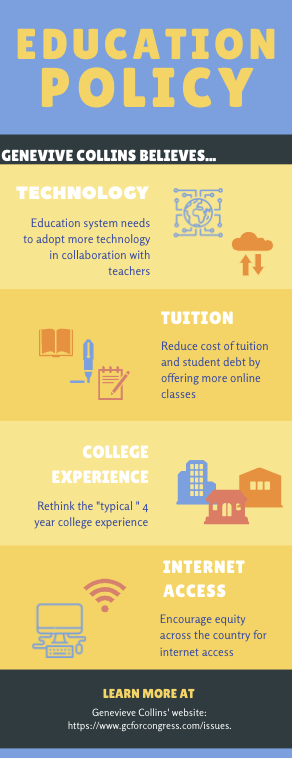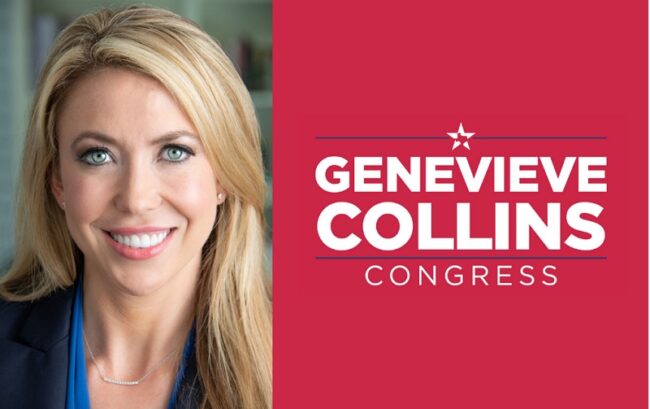This is part of an ongoing discussion with the candidates running for Texas-32. We will be posting Incumbent U.S. Rep. Colin Allred’s answers on these topic in one week.
Genevieve Collins is running for election to the U.S. House of Representatives to represent Texas’ 32nd Congressional District. She will be on the ballot in the general election on November 3 representing the Republican Party.
The Daily Campus had the chance to sit down with Collins to discuss her policies about education, involvement at SMU, and business background experience.
She hopes her business background will help her bring “more business to government,” which she believes will make the government operate more efficiently.
Part of that is balancing the budget and making the government more fiscally responsible like everyday citizens.
“We have to find a way to balance the budget,” she said. “Whether you are a family or college student, you do a zero-based budget.”
In addition to the budget, Collins would bring a younger voice to government, one that understands communication and business in the private sector. Her experience of overseeing interdepartmental cooperation within Istation has taught her that departments that don’t communicate lead to failing business.
She hopes to get government departments talking with one another so that they can address the issues she discussed with us.
Improving Access to Technology
Collins’ biggest advocacy is for equity in technology. She believes that it is essential for any future government infrastructure bills to include greater access to an internet connection.
“Technology has to be the great equalizer whether you’re in elementary school or post-graduate,” she said. “Millions of kids are left behind because they don’t have the bandwidth or technology.”
Collins has seen how technology can improve the educational experience during her role as the Senior Vice President and Head of Corporate Strategy at Istation. The company provides an online learning platform that complements a traditional in-person education.

In her opinion, we are beginning to realize how important technology is in our lives and for our education in the middle of the COVID-19 pandemic.
Creating Jobs for Upcoming Graduates
Collins graduated from SMU at a testing time during the height of the 2008 Great Recession. She believes this gives her an edge at understanding the economic uncertainty that upcoming graduates face in a recovering job market.
Her plan to help graduates succeed in the job market is by having universities focus on internships and apprenticeships. Collins serves on the SMU Cox Alumni Board which helps promote such opportunities for students in the Cox School of Business.
Collins also stated that there needs to be a greater emphasis on making capital available to entrepreneurs who wish to start their own businesses as a way to create more jobs.
Making Loans More Affordable and Accessible
A government presence that’s problematic for Collins is the presence of the federal government in the loan business.
This feeds into her policy of making the federal government’s federal aid program Free Application for Federal Student Aid (FAFSA) more intuitive and easier to navigate.
Collins said that 2 million students missed out on federal pell grants because they did not apply. She hopes her improved system might help some of those students who slip through the cracks.
In addition to making FAFSA easier to manage, she hopes to create a directory of available scholarships so that students know what’s available to them. This way, students wouldn’t have to fill out several scholarship applications in addition to college applications.
Collins added that loans should be privatized in order to make them more competitive and keep interest rates down. She hopes this will help reduce the overall cost of college by making loans more affordable and accessible.
She cites how some of her friends who work full-time jobs and are starting families still worry about repaying student loans. In her view, going to college shouldn’t be a huge financial constraint down the road because of student loans with high interest rates.
Overall, the 7th Generation Texan hopes to increase job opportunities for Texans, while ensuring that they maintain their financial freedom. She will be running against incumbent Collin Allred (Democratic Party), Christy Mowrey (Libertarian Party), and Jason Sigmon (Independent).
Connor Pittman also contributed to this report.















